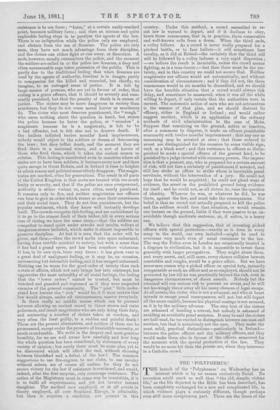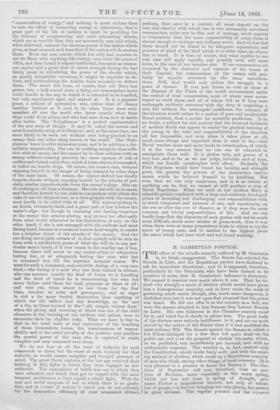THE POLYPHEMUS.'
THE launch of the 'Polyphemus' on Wednesday has an interest which is by no means exclusively Naval. No invention could mark so well that "the old, simple, violent life," as the life depicted in the Bible has been described, has been completely exchanged for a new and complicated life, in which violence plays a curiously different, though perhaps even still more conspicuous, part. These are the times of the
"conservation of energy," and nothing is more curious than to note the effect of conserving energy so elaborately, that a great part of the life of nations is spent in providing for the delivery of overpowering and most exhausting shocks, which are so terrible that they are necessarily rare, and which, when delivered, exhaust the nervous-power of the nation which gives, at least as much as it does that of the nation which receives them. Even our own nation, which has only had occasion to use its Navy with anything like energy, once since the peace of 1815, and then found it almost ineffectual, has spent an enorm- ous capital and a great deal of moral strength during the last thirty years in calculating the power of the shocks which, on purely imaginable occasions, it might be requisite to de- liver, and accumulating the hidden force necessary to deliver them. The result has been, of course, that our Navy has grown into a half-unreal state, a thing our commanders never really handle in the way in which it is intended to be handled, but only experiment upon and marvel at. It is a gigantic guess, a subject of speculative awe, rather than of cheery familiar interest as it used to be when there were com- manders all over the world who know exactly what their ships could do in action, and who had seen them do it in battle after battle. The 'Polyphemus 'is a perfect representative of the new state of things. It may be called the newest and most formidable sting of civilisation ; and, at the same time, one more likely to be worn out without ever being planted in an enemy than any other sting known to the world. The Poly- phemus ' has a terrible submarine ram, and is in addition a for- midable torpedo-ship. She can do nothing except in close colli- sion with an enemy, and she cannot be in close collision with an enemy without running precisely the same amount of risk of sudden and violent extinction, which it is her object, if successful, to inflict on hostile ships. Of course, she cannot ram, without exposing herself to the danger of being rammed by other ships of the same kind. Of course, she cannot deliver her deadly torpedo-shocks without exposing herself to the attacks of pre- cisely similar torpedo-shocks from the enemy's ships. She can do nothing at all from a distance. Her sole use will be to cause, and therefore herself to run, risks in comparison with which the risks of our old ships-of-war, in a close grapple with the enemy, were hardly to be called risks at all. Her armour-plating is, no doubt, extremely thick, and a great part of her is below the • water's edge ; but though in ramming and darting torpedoes at the enemy this armour-plating may protect her effectually from what would otherwise be her destruction, it may, on the other hand, if she is not managed with the swiftest and most daring hand, become in a moment a mere dead-weight, to render her a helpless object of the attacks of the enemy. And the one thing one is quite certain of is, that nobody will be able to form even a satisfactory guess of what she will do in any par- ticular man's hands, if it ever comes to the warlike use of her, because there will never be any means either of adequately testing her, or of adequately testing the man who has to command her, till the supreme moment comes. We want for such a command, cool, scientific daring, of a very rare kind,—the daring of a man' who has been trained in science, who can measure exactly the kind of forces he is handling and the kind of forces he is encountering, but who has never before used them for such purposes as these at all ; and who yet, when about to use them for the first time, remains as calm and peremptory, and as eager to risk a far more fearful destruction than anything of which our old sailors had any knowledge, on the cast of a die, as those trained in the "old, simple, violent days," when the giving and receiving of blows was one of the chief elements in the training of our soldiers and sailors, were to encounter their far slighter risks. What we have to fear is, that in the total want of real experience of the handling of these tremendous forces, the consciousness of respon- sibility and of the awful novelty of the position may paralyse the mental power of the man who is expected to retain complete and easy command over them.
We do not fear at all the want of audacity for such commands as these, but the want of such training for that audacity as would ensure complete and tranquil presence of mind. The great Naval captains of the last age received their training in fifty rights in which they were engaged as sub- ordinates. The atmosphere of battle was one in which they were educated, and which they got to regard with the same buoyant carelessness as boys regard a school fight. With the new and awful weapons of war in which there is no grada- tion, and in a state of society in which you do not seriously try the destructive efficiency of your armament oftener, perhaps, than once in a century, all must depend on the ease and alacrity with which one or two necessarily untrained commanders, quite new to this sort of carnage, wield engines so tremendous that the mere responsibility of using them is almost enough to unhinge any ordinary nerve. And we fear lest there should not be found to be adequate equanimity and presence of mind of the kind which it so often takes an educa- tion to breed. It is true, of course, that what applies to our own case will apply equally, and possibly with still more force, to the case of our enemies also. If our commanders are overawed by the character and vastness of the forces at their disposal, the commanders of the enemy will pro- bably be equally overawed by the same considera- tions. Still, that would only reduce the struggle to a game of chance. If you had forces so vast as those at the disposal of the Fleets of the world accumulated under the control of rival commanders, none of whom wore accus- tomed to wield them, and all of whom felt as if they were archangels suddenly entrusted with the duty of exploding a star, but without the archangels' confidence, the outcome of the situation would rather be a matter of pure and incalculable Naval accident, than a matter for scientific prediction. It is, no doubt, a subject for real anxiety that the external incidents of modern Naval war appear to render the gradual training of the young in the risks and responsibilities of the situation all but impossible, and even when it takes place at all, much more abrupt and imperfect than it used to be,—that Naval warfare more and more tends to catastrophes, of which it is the very essence that no one can be educated to manipulate them well. It is genius only, and genius of a very rare, and so far as we can judge, invisible sort of type, which can handle catastrophes with effect. Probably the First Napoleon would have found his lucidity and strength grow, the greater the powers of the destructive instru- ments which he believed himself to be handling. But even that we can only conjecture, and it is as certain as anything can be, that we cannot at will produce a crop of Naval Napoleons. What we need in our modern Navy is scientific genius combined with a large and suddenly developed power of accepting and discharging vast responsibilities with as much composure and sureness of aim and equanimity, on the eve or after the eve of disaster, as if they were the most common and trivial responsibilities of life. And we can hardly hope that the discovery of such genius will not be much more difficult, much more matter of guess-work, than it was when there were so many preparatory trials in which to try the nerve of young men, and to mature to the highest point the nerve which had been tried and not found wanting.

































 Previous page
Previous page